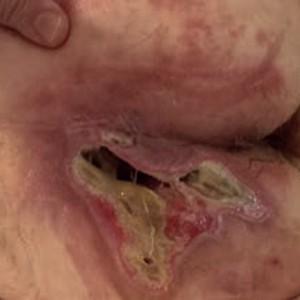Kennedy’s terminal ulcer and pressure injury: two different aspects of medical liability related to the same injury

Submitted: April 26, 2023
Accepted: June 9, 2023
Published: July 25, 2023
Accepted: June 9, 2023
Abstract Views: 645
PDF: 269
PDF (Italiano): 269
PDF (Italiano): 269
Publisher's note
All claims expressed in this article are solely those of the authors and do not necessarily represent those of their affiliated organizations, or those of the publisher, the editors and the reviewers. Any product that may be evaluated in this article or claim that may be made by its manufacturer is not guaranteed or endorsed by the publisher.
All claims expressed in this article are solely those of the authors and do not necessarily represent those of their affiliated organizations, or those of the publisher, the editors and the reviewers. Any product that may be evaluated in this article or claim that may be made by its manufacturer is not guaranteed or endorsed by the publisher.
Similar Articles
- Riccardo Garcea, The informed consent for wound care treatment: legislative - juridical analysis and proposal of a model for single treatment , Italian Journal of Wound Care: Vol. 4 No. 2 (2020)
- Roberto Anichini, Enrico Brocco, Marco Cavallini, Roberto Da Ros, Luigi Uccioli, Ciro Pempinello, Elisabetta Salutini, Maurizio Volpini, Alice Volpini, Luca Monge, Grey-zone in the treatment of patients with Diabetic Foot. The results of an Italian multidiscipli-nary Delphi survey conducted among a group of experts , Italian Journal of Wound Care: Vol. 4 No. 2 (2020)
- Giuseppe Nebbioso, Ciro Falasconi, Viviana Nebbioso, Francesco Petrella, Pain and chronic skin ulcers , Italian Journal of Wound Care: Vol. 4 No. 1 (2020)
- Giovanni Petracca, Francesco Zappia, Giuseppe Maccarone , Necrotizing fasciitis: A case report and a review of the literature , Italian Journal of Wound Care: Vol. 5 No. 2 (2021)
- Paola Leonardelli, Rachele Stelzer, Patient with skin injuries in home care: Advice from the expert wound care nurse. Define and standardize the process at a territorial level , Italian Journal of Wound Care: Vol. 6 No. 2 (2022)
You may also start an advanced similarity search for this article.


 https://doi.org/10.4081/ijwc.2023.101
https://doi.org/10.4081/ijwc.2023.101




